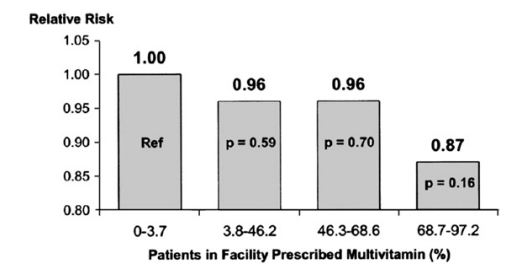During the progression of chronic kidney disease (CKD), the requirements and utilization of different nutrients change significantly. These changes ultimately place patients with kidney disease at a higher risk for nutritional and metabolic abnormalities. Prevention and treatment of these nutritional deficiencies are essential for optimal care of patients with CKD.
Some of the reasons for micronutrient deficiencies in CKD patients are as follows:
- Uremic toxins can change the way of uses vitamins and minerals and interfere with GI absorption and activity of some vitamins.
- Some of the medicines that patients take can change the way the body uses some vitamins and minerals.
- If the patients are on dialysis, some vitamins are also lost during the dialysis treatment. In addition, patients
- who are still producing urine are at a higher risk of losing water-soluble vitamins.
- Limiting the intake of protein and food sources containing potassium and phosphorus, is one of the main treatments for kidney failure. Following this type of special diets is another reason for the deficiency of vitamins and minerals in CKD patients.
- Frequent periods of anorexia or illness in patients reduce the intake of vitamins and minerals even more.
Due to these conditions, multivitamin supplements are usually prescribed for CKD patients. Renalix tablet is a complete daily multivitamin specially formulated for people with kidney failure.
Contains vitamins B, C and D, zinc, iron and selenium
- Compensating for the lack of micronutrients caused by food restrictions and increased excretion during dialysis
- Providing B group vitamins in kidney patients, especially folic acid
- Providing zinc and vitamin D needed by people with kidney failure
- Prevention of anemia due to the presence of iron, folic acid and B12
- Strengthening the immune system
| Nutrition information per 1 tablet | |
| 60 mg | Vitamin C |
| 1000 IU | Vitamin D3 |
| 1.5 mg | Vitamin B1 |
| 2 mg | Riboflavin |
| 20 mg | Niacin |
| 15 mg | Vitamin B6 |
| 800 µg | Folic acid |
| 2.4 µg | Vitamin B12 |
| 60 µg | Biotin |
| 5 mg | Vitamin B5 |
| 15 mg | Iron (as ferrous fumarate) |
| 9 mg | Zinc (as zinc oxide) |
| 55 µg | Selenium |
B-complex Vitamins
Dietary restrictions, especially food sources containing water-soluble vitamins such as fruits, vegetables, and dairy products, increase the risk of B vitamins deficiency in CKD patients. Most B vitamins are lost through dialysis at approximately the same rate as they are lost in the urine, with the exception of folate, which is highly dialyzable. Uremic toxins may also interfere with the activation of some vitamins, including inhibiting the phosphorylation of pyridoxine and its analogs. For this reason, the deficiency of B vitamins is common in CKD patients who do not receive supplements and increases the risk of morbidity and mortality.
Daily intake of folic acid along with other B vitamins appears to be associated with reductions in CRP and blood homocysteine levels. In addition, niacin helps to reduce the level of phosphate in ESRD patients because it interferes with the activity of the sodium phosphate pump in the lumen of the GI tract and reduces the transfer of phosphate.
Vitamin C
In adults with CKD 1-5D or post-transplantation who are at risk of vitamin C deficiency, vitamin C supplementation is recommended to meet the daily requirement of this vitamin. Patients with any malabsorption or inflammatory diseases may be at higher risk for decreased plasma vitamin C levels.
Vitamin D
CKD patients are at high risk of vitamin D deficiency due to dietary restrictions and kidney dysfunction. In adults with CKD 1-5D or post-transplantation, vitamin D supplementation is essential. Vitamin D supplementation reduces PTH levels in patients who are non-dialyzed, those treated by HD or PD, and kidney transplant recipients. Reducing PTH plays an important role in maintaining bone health.
Iron
Iron deficiency is common in individuals with CKD and plays a critical role in the development of anemia. Hepcidin concentrations are commonly elevated in individuals with CKD, likely due to a combination of decreased kidney clearance of circulating hepcidin and enhanced levels of systemic inflammation that stimulate hepcidin expression. Increased hepcidin concentration, blocks intestinal iron absorption and iron release from iron storage sites, therefore reduces the availability of iron for erythropoiesis and leads to anemia in CKD patients.
Zinc
Zinc is an essential micronutrient and has anti-inflammatory effects. Zinc deficiency has been shown to increase oxidative stress and may be associated with impaired insulin secretion and increased CVD risk. A high prevalence of zinc deficiency has been reported in HD patients. For this reason, zinc supplementation can be helpful in these patients.
Selenium
Several studies have suggested that HD patients have low levels of selenium compared with healthy controls, and deficiency of this trace element may contribute to increased oxidative stress and inflammation. There are also some evidences that low selenium levels may be associated with increased death risk in HD patients, especially death due to infections .

